Below is his official obituary. Our prayers go to all who knew and loved him, and for the repose of his holy soul.
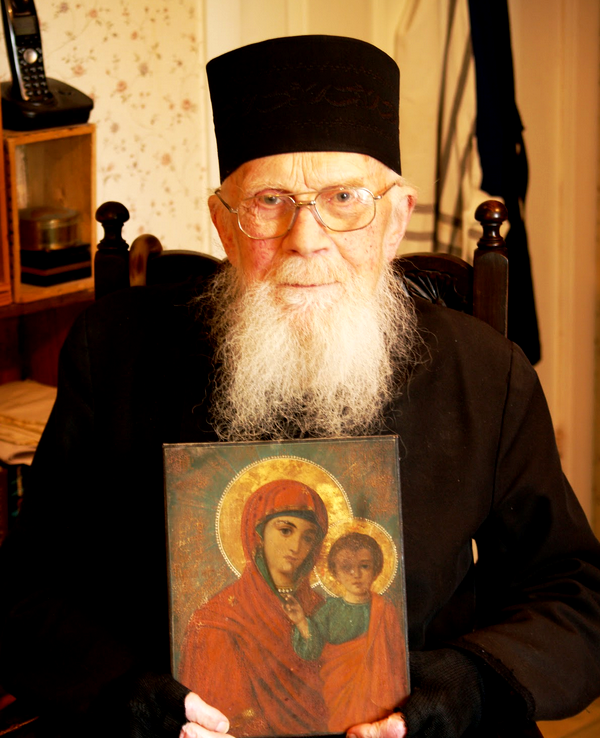 Archimandrite John Maitland Moir (1924 – 2013)
Archimandrite John Maitland Moir (1924 – 2013)
Father John Maitland Moir, Priest of the Orthodox Church of St Andrew in Edinburgh, founder of many smaller Orthodox communities throughout Scotland and Orthodox Chaplain to the University of Edinburgh, died peacefully in Edinburgh Royal Infirmary on the 17th April 2013.
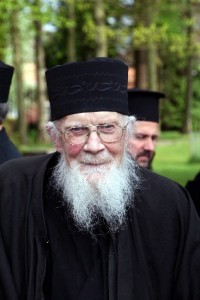 A man of profound holiness and bedazzling eccentricity, of boundless compassion and canny wisdom, utterly selfless and stubbornly self-willed, serenely prayerful and fiercely self-disciplined, Father John will surely earn a place as a unique and outstanding figure in the ecclesiastical annals of Scotland. He was born in 1924 in the village of Currie where his father was the local doctor; his fondness for his mother was always mingled with quiet pride in the fact that she was a member of the lesser aristocracy. The privileged but somewhat severe upbringing of an only child in this household together with a chronic weakness in his knees kept him apart from the hurly-burly of boyhood and directed him from an early age to more spiritual and intellectual pursuits. After his schooling at Edinburgh Academy, he went on to study Classics at Edinburgh University during the war years, his never robust health precluding any active military service. After the war, and a short spell as Classics Master at Cargilfield School in Perthshire, he moved to Oxford to continue classical studies at Christ Church and theological studies at Cuddesdon Theological College.
A man of profound holiness and bedazzling eccentricity, of boundless compassion and canny wisdom, utterly selfless and stubbornly self-willed, serenely prayerful and fiercely self-disciplined, Father John will surely earn a place as a unique and outstanding figure in the ecclesiastical annals of Scotland. He was born in 1924 in the village of Currie where his father was the local doctor; his fondness for his mother was always mingled with quiet pride in the fact that she was a member of the lesser aristocracy. The privileged but somewhat severe upbringing of an only child in this household together with a chronic weakness in his knees kept him apart from the hurly-burly of boyhood and directed him from an early age to more spiritual and intellectual pursuits. After his schooling at Edinburgh Academy, he went on to study Classics at Edinburgh University during the war years, his never robust health precluding any active military service. After the war, and a short spell as Classics Master at Cargilfield School in Perthshire, he moved to Oxford to continue classical studies at Christ Church and theological studies at Cuddesdon Theological College.
His interest in Eastern Christendom was awakened in Oxford and he eagerly seized the opportunity to study at the famous Halki Theological Academy in Istanbul in 1950-51. During this year he also travelled in the Holy Land and Middle East and forged friendships in the Eastern Churches which he maintained throughout his life. On his return to Scotland he was ordained in the Scottish Episcopalian Church, which he was to serve faithfully for the next thirty years. His first charge was as Curate at St Mary’s in Broughty Ferry, then for a period of six years he taught at St Chad’s College, Durham. He returned to Scotland in 1962 as Curate in Charge of the Edinburgh Parish of St Barnabas and as Honorary Chaplain at St Mary’s Cathedral, then in 1967 he moved north to the Diocese of Moray where he served as Chaplain to the Bishop of Moray and latterly as Canon of St Andrew’s Cathedral in Inverness. His devotion to his pastoral and liturgical duties as well as his personal holiness and prayerfulness inspired a sense of awe in his loyal parishoners. Only his habit of wearing the kilt beneath his cassock provoked a reprimand from his Bishop, who was more than somewhat bewildered by Father John’s fervent and unbending Scottish patriotism. The Scottish Episcopalian Church which Father John loved and served was, he believed, a Church with special affinities with the Eastern Churches: his eyes would light up when explaining how the Liturgy of Scottish Episcopalian Church, like those of the East, contained an epiclesis. With the passing of the years, however, he became convinced that the Scottish Episcopalian Church was moving ever further away in faith and in practice from that common ground with the Orthodox Church which he had also come to know and love and whose prayer he had made his own.
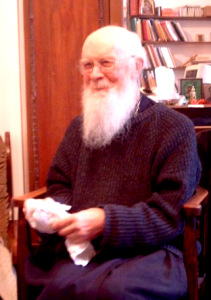 In 1981, he resigned from his position in the Diocese of Moray and travelled to Mount Athos where he was received into the Orthodox Church at the Monastery of Simonopetra. He returned to Britain to serve now as an Orthodox Priest in the Greek Orthodox Archdiocese of Thyateira and Great Britain with utter devotion for a further full thirty years.
In 1981, he resigned from his position in the Diocese of Moray and travelled to Mount Athos where he was received into the Orthodox Church at the Monastery of Simonopetra. He returned to Britain to serve now as an Orthodox Priest in the Greek Orthodox Archdiocese of Thyateira and Great Britain with utter devotion for a further full thirty years.
After three years in Coventry, Father John returned to Scotland where he united the two small Orthodox communities in Edinburgh, one Slavonic and one Greek, into the single Orthodox Community of St Andrew. At the same time, he travelled tirelessly around the country by bus serving often tiny groups of Orthodox Christians in Aberdeen, Inverness, Perth, Dundee, St Andrews, Stirling and elsewhere. For Father John, the Orthodox Church was what his beloved C.S. Lewis would call ‘Mere Christianity’, transcending the bounds of nationality and language and embracing all who seek to live a Christian life – the scandal of the cross and the glory of the resurrection. It also embraced for him the most precious elements in the Christian history of Scotland, especially that vision of Christianity expressed in figures such as St Columba and St Cuthbert. An ascetic by nature, his interest was in a practical Christianity nourished by prayer and tradition, rather than in the aesthetic refinements and intellectual gymnastics that attract many Westerners to the Orthodox Church. Not without opposition from members of his flock, Father John introduced English as the common language of worship and succeeded in creating a truly international community reflecting the many nationalities of the Orthodox students studying at the Scottish Universities and of the Orthodox families living and working in Scotland. As the Orthodox Church in Scotland grew in numbers through migration from traditionally Orthodox countries, so did the proportion of Scottish members who found themselves at home in the Community.
His role as Chaplain to the University of Edinburgh was one he took very seriously. The Chapel of St Andrew, set up at first in his house in George Square and then transferred to the former Buccleuch Parish School by the Meadows, lay at the heart of the University complex; the daily services held there with unfailing regularity and its ever open door provided and continues to provide a firm point of reference for countless students. The Chapel of St Andrew, however, was also the base for his work at the other Edinburgh Universities and throughout Scotland – work now being continued with equal zeal and selflessness by two gifted Priests, Fr Avraamy and Fr Raphael.
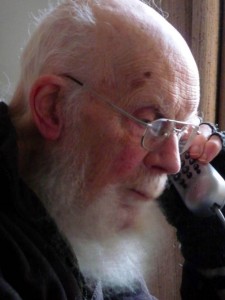 Father John subjected himself to an almost unbelievably austere ascetic regime of fasting and prayer, while at the same making himself available to everyone who sought his assistance, spiritual or material, at all times of day and night. His care for the down-and-out in Edinburgh provoked admiration and no little concern in many parishioners who would come to the Church, which was also his home, only to find him calmly serving coffee with aristocratic gentility to a bevy of homeless alcoholics or to find a tramp asleep on his sofa. He was tireless in his efforts to help the victims of torture and persecuted Christians throughout the world. Few days would pass without him writing a letter of support for someone in prison or in mortal danger. He had inherited a comfortable fortune, he died penniless, having dispersed all his worldly assets to the deserving and undeserving in equal measure.
Father John subjected himself to an almost unbelievably austere ascetic regime of fasting and prayer, while at the same making himself available to everyone who sought his assistance, spiritual or material, at all times of day and night. His care for the down-and-out in Edinburgh provoked admiration and no little concern in many parishioners who would come to the Church, which was also his home, only to find him calmly serving coffee with aristocratic gentility to a bevy of homeless alcoholics or to find a tramp asleep on his sofa. He was tireless in his efforts to help the victims of torture and persecuted Christians throughout the world. Few days would pass without him writing a letter of support for someone in prison or in mortal danger. He had inherited a comfortable fortune, he died penniless, having dispersed all his worldly assets to the deserving and undeserving in equal measure.
His habits of life would have marked him as a caricature of Scottish parsimony had they not been joined to an extraordinary generosity of spirit. All his voluminous correspondence was meticulously hand-written on scraps of recycled paper and dispatched by second-class mail in reused envelopes, whether he was writing to Dukes and Prelates or to the indigent and distressed. For many years, he was a familiar sight on the streets of Edinburgh as he passed by on his vintage electric bicycle, his black cassock and long white beard furling in the wind.
As his physical strength ebbed away, he was comforted by the love and care of those who looked to him as their spiritual father and by the ministrations and devotion of his fellow clergy. He was also tended by the medical expertise of the Greek doctors of the Community towards whom he never ceased to express his gratitude.
The last year of his remarkable life was perhaps the most remarkable of all. Completely bed-ridden, nearly blind and almost totally deaf, he devoted himself even more fully to prayer, especially to prayer for the continued unity, harmony, well-being and advancement of the Orthodox Communities in Scotland. On the day he died, an anonymous benefactor finally sealed the purchase of the former Buccleuch Parish Church for the Orthodox Community of St Andrew in Edinburgh thus securing a material basis for the realization of the spiritual vision that had inspired Fr John throughout his life.
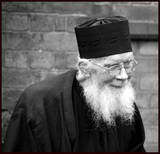 May his Memory be Eternal!
May his Memory be Eternal!

Truly a holy man: may he continue to pray for us all.
Memory Eternal!
May his memory be eternal!
I did not know Fr John but this obituary and eulogy was indeed inspirational – it is a moving contribution for all Orthodox throughout the world at the very special time of Holy Week
May God bless his soul and grant him eternity
He baptised me.
He is the best man I have ever met.
God bless him.
“Precious in the sight of the Lord is the death of His saints.”-Psalm 116:15. Truly, Christ IS in our midst, as witnessed by His Friend:: Father John maitland . Memory Eternal.
Father John sounds like a wonderful church presbyter and a living testament to the Words, ” Feed the hungry, welcome the stranger, and visit the sick.” Most priests and lay people are too worried about security, to welcome the Homeless around the church, yet the Lord commands it.
Saint John Maitland Moir, please pray for Scotland and God’s people,
Amen Teresa